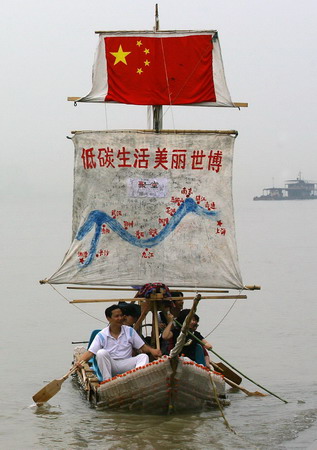Profiles
Sailing miles on plastic for a cause
By Wu Yiyao (China Daily)
Updated: 2010-06-18 08:11
 |
Large Medium Small |
Shanghai - If, for some reason, you had 2,010 empty plastic bottles at your disposal, what would you do? You'd probably phone in a scrap dealer, right?
But Xia Yu, a 36-year-old pub owner from Xiangtan, Hunan province, is clearly not your average fellow human.
|
 Xia Yu on his boat on May 18, 2010. [Provided to China Daily] |
Instead of chucking away hundreds of used bottles his customers would leave behind in the pub, he waited till he collected 2,010, and then built a boat with them.
And not just a showboat to keep in the corner of his pub - as you read this, Xia is, in fact, rowing his 7-m-long 2-m-wide raft made with plastic bottles and a wooden framework, held together with a bunch of iron wires, on a river somewhere in Anhui province, slowly inching towards his destination: the Expo Garden in Shanghai.
You may have figured it out. The count of 2,010 plastic bottles was to commemorate Expo 2010 Shanghai.
On May 1, the opening day of the Expo, Xia, together with five friends, set sail on a 1,500-km journey from Xiangtan to the Expo Garden on the Yangtze River, despite waves of doubt that they'll make it.
|
|
After all, the boat they set sail on can hardly be called a boat. It cost only 2,000 yuan to build in a matter of a month.
Sure, they did some trial runs, but rowing 40 km a day fighting whirlpools, rapids and strong waves of the Yangtze is a different story altogether.
What's keeping Xia going is a major cause behind the trip.
"We are examining water contamination through our journey and trying to promote a low-carbon lifestyle," Xia told China Daily on the phone from Anqing, Anhui province, some 700 km from Shanghai.
"In order to make life better, we need to first correct some basic things, like not throwing things into the water."
There is a banner on the raft that reads: "Low-carbon lifestyle, beautiful Expo", below which is the route of its journey.
The tiny boat has no room for facilities like a kitchen or a toilet. Xia and his fellow sailors have to wait for "delayed gratification" until evening falls, when they have to dock for the night.
They stay at hostels in towns and farmhouses in villages, and at times, when they can't find a bed, they just erect a tent and crash out.
"Before we started, no one believed we could sail the boat to the Dongting lake. But we did it. Then they said we would not be able to pass the Yangtze River, but we have already crossed Wuhan and Jiujiang," Xia said on June 7, when he reached Pengze, the northern tip of Jiangxi province.
But just as they expected, the journey has not always been smooth. Of the six that set sail from Xiangtan, four quit one after the other to "return to normal life".
As of press time on Thursday, only Xia and his friend Huang Ying were on the boat.
"Whenever people see us rowing the boat, they shout out that we are risking our lives," Xia said, adding, "But actually, the boat has proved pretty safe so far, and we both are very good swimmers."
Xia and his mates have had to repair the boat from time to time.
"Sometimes, we have to replace some worn out bottles with fresh ones we collected on the way," Xia said.
He said their death-defying journey has also attracted a number of people, who have expressed a desire to join the crew.
"But no one physically showed up at the designated time or place. I think they were still worried about their safety," Xia said.
Xia's mate Huang suffered from hermaturia when they reached Jiujiang, Jiangxi province, the mid-point of their journey, where they had to await Huang's recovery.
"Most of the time we're traveling at the mercy of luck," Xia said. "There are so many things that can stop us from making it to Shanghai, like the weather, health, and most probably, the law."
"The boat is not produced in a legitimate factory, and our journey is not permitted by marine sector authorities."
However, Xia said he is grateful to marine authorities in Hunan, Hubei, and Jiangxi provinces for "being understanding".
"Some boats that passed us by have been very kind to us and offered help when we needed it the most," Xia said. "We are very glad to see that people are supporting us in various ways."
What is more of a reward for Xia and Huang is that the Yangtze River turned out much cleaner than they had expected.
"We did see waste floating on the Yangtze River, but it is not as terrible as we imagined," Xia said.
Although Xia and Huang are uncertain about the journey ahead and clueless if they will be able to make it to Shanghai, they are "quite happy" with what they have already achieved.
"After all, it's not the destination that counts," Xia said. "It's always the course that matters the most."
